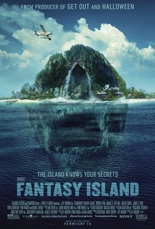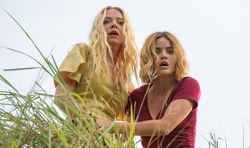
 A TV mainstay of the 1970s, Fantasy Island ran for seven seasons successfully by adhering to a four-step formula, sprinkled liberally with Ricardo Montalban as suave resort host Mr. Roarke:
A TV mainstay of the 1970s, Fantasy Island ran for seven seasons successfully by adhering to a four-step formula, sprinkled liberally with Ricardo Montalban as suave resort host Mr. Roarke:
1. Guests fly to the titular isle.
2. Guests experience their fantasy.
3. Guests learn a lesson.
4. Guests depart the island.
Jeff Wadlow’s film version of Fantasy Island does the same, yet can’t succesfully make it through less than two hours. The concept’s second step is so malleable and ripe with possibilities that it would be difficult to botch, yet the Blumhouse production does just that. It isn’t the incompetent train wreck its savage reviews may suggest; it’s just boring, which is arguably worse.
 In for Montalban is End of Watch’s Michael Peña as Roarke. Among his weekend guests are a sandblasted Lucy Hale (reteaming with Wadlow from Blumhouse’s Truth or Dare), out for revenge; Priest’s Maggie Q, out for love; Swallow’s Austin Stowell, out for closure; and brothers Ryan Hansen (Central Intelligence) and Jimmy O. Yang (Patriots Day), out to get laid. Other than keep these subplots on separate tracks as the TV show, anthology-style, Wadlow attempts to unify them into one big plot weighed down with rules and mythology no one wants or needs explained.
In for Montalban is End of Watch’s Michael Peña as Roarke. Among his weekend guests are a sandblasted Lucy Hale (reteaming with Wadlow from Blumhouse’s Truth or Dare), out for revenge; Priest’s Maggie Q, out for love; Swallow’s Austin Stowell, out for closure; and brothers Ryan Hansen (Central Intelligence) and Jimmy O. Yang (Patriots Day), out to get laid. Other than keep these subplots on separate tracks as the TV show, anthology-style, Wadlow attempts to unify them into one big plot weighed down with rules and mythology no one wants or needs explained.
The problem in doing so is that each begins with distinct elements, from torture porn to raunchy comedy to family drama, then all shoved under the veneer of the supernatural. And since no subplot works on its own, they underwhelm even more in tandem. As a mor(t)ality tale, Fantasy Island throws viewers a lot of things that sound inviting — duplicitous duplicates, sea snakes, Charlotte McKinney’s bouncing breasts — but add nothing to its spooky stew of emptiness. I wish I had seen it in theaters, if only to witness audience members’ reaction to the last shot’s “reveal”; I suspect they groaned, and they had every right. —Rod Lott
